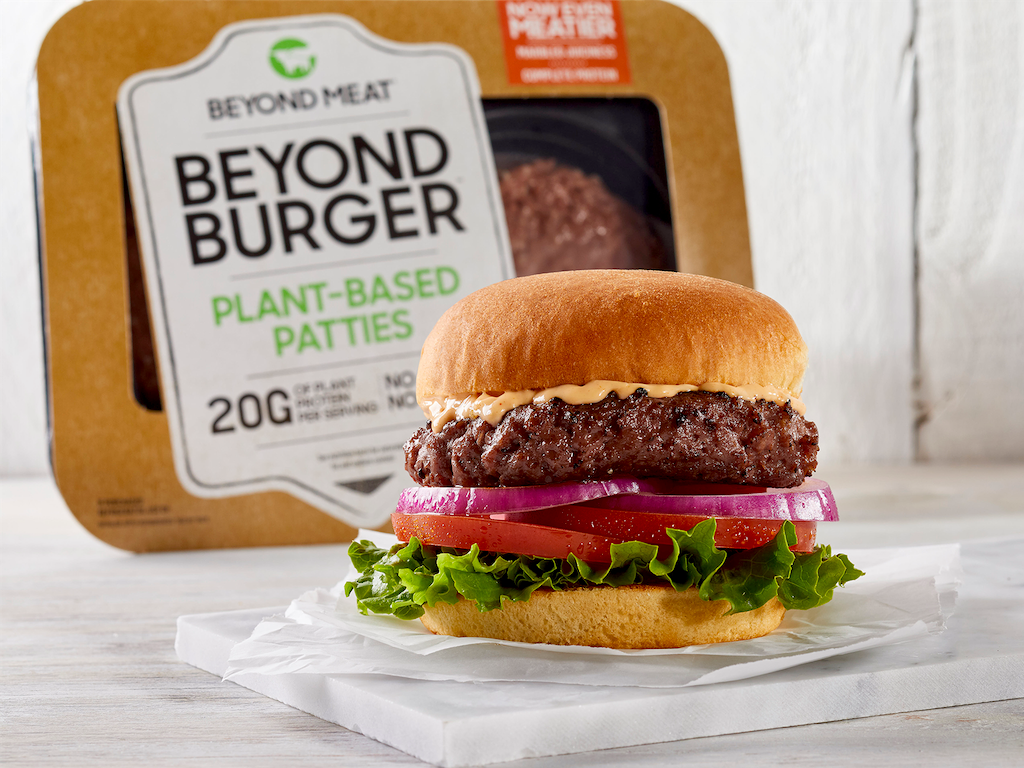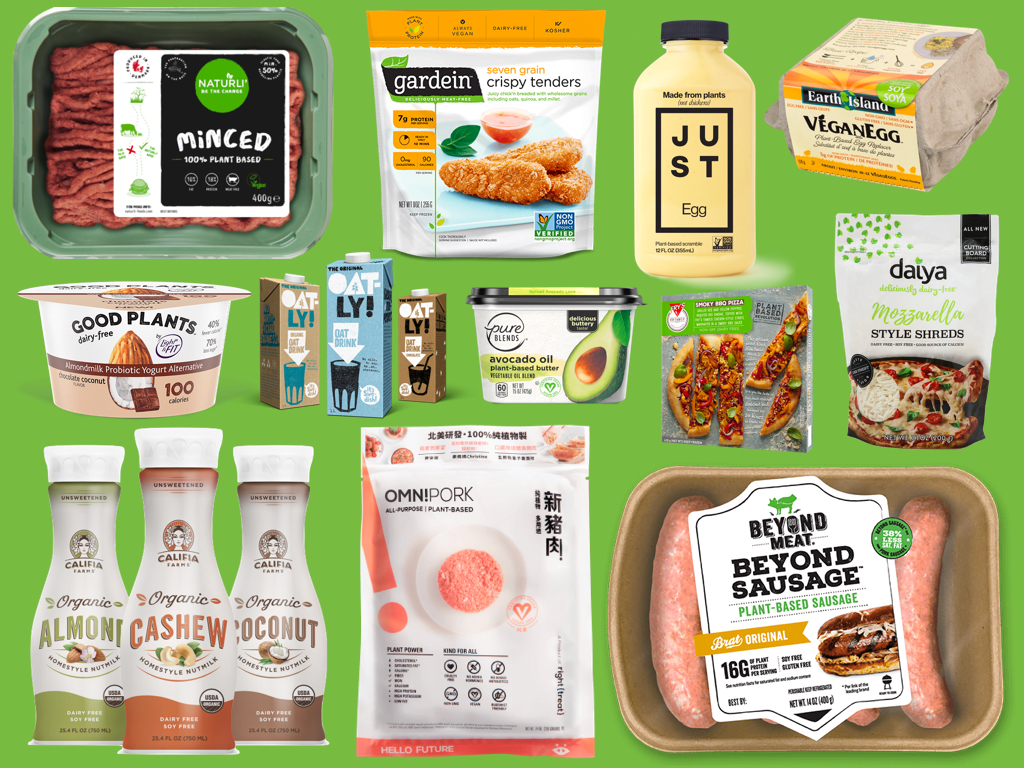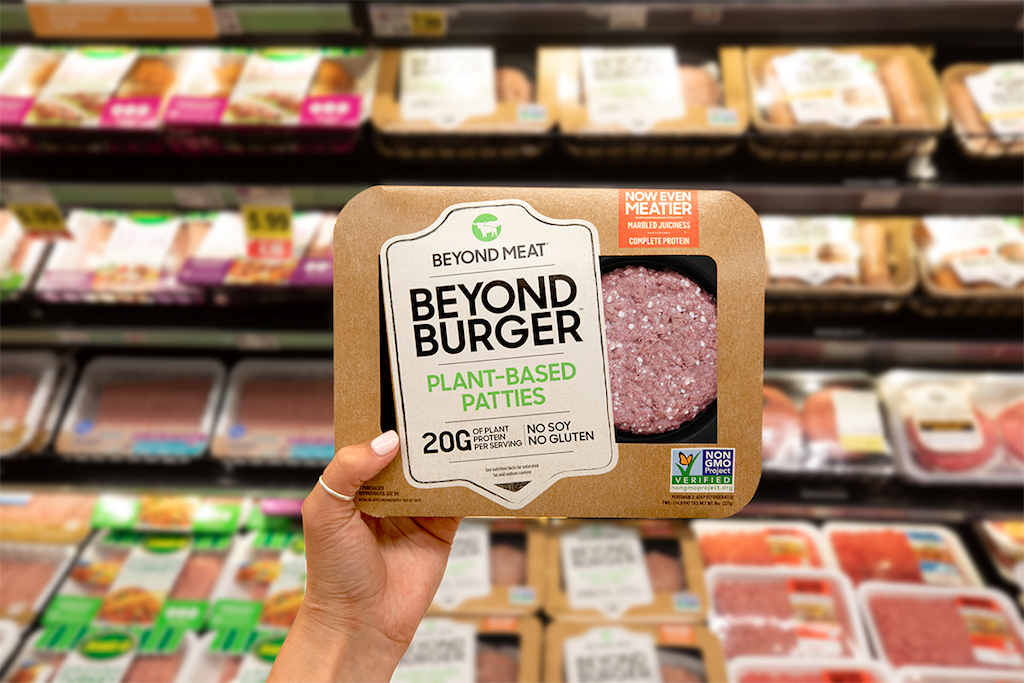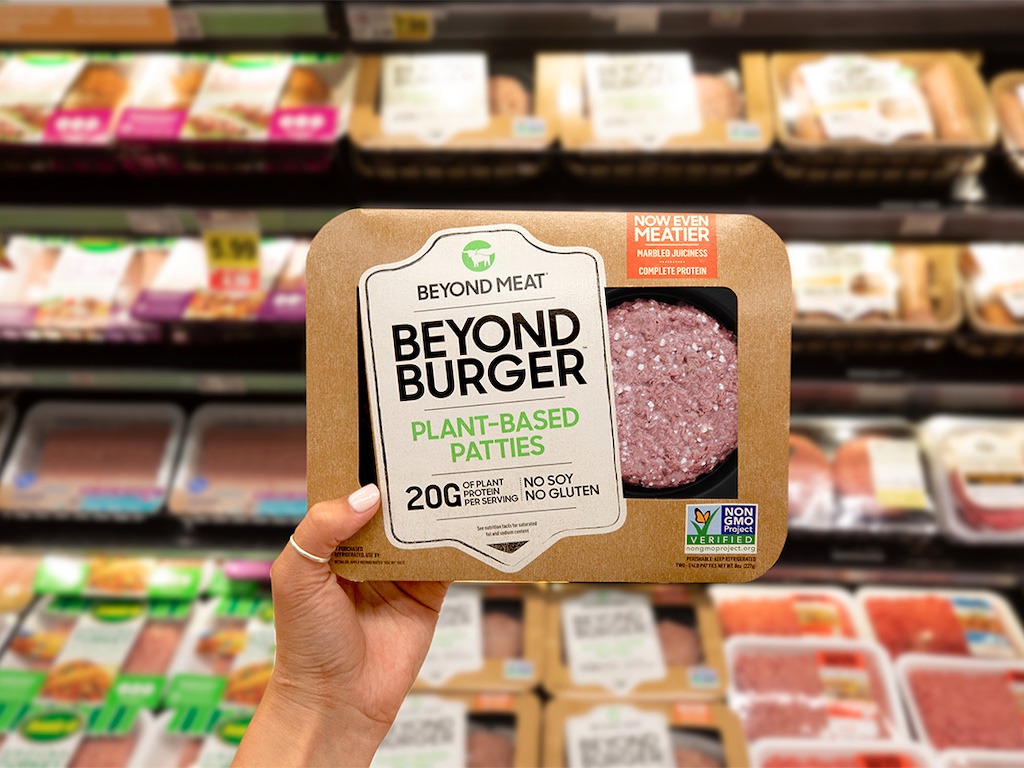9 Mins Read
On May 2, 2019, Beyond Meat, the California-based plant-based food tech company famous for their meat-free burgers and sausages, went public. The company became the world’s first vegan meat alternative to list on the US stock market. A lot has changed since then for Beyond Meat and the wider plant-based industry, becoming one of the fastest growing global sectors today. Let’s take stock, one year after the IPO changed plant-based meat forever.
A watershed moment for plant-based meat
It’s hard to overstate the significance of Beyond Meat’s IPO, which represented a massive turn for the company and the wider plant-based industry that had long been overlooked as “niche,” a marginal trend that would never catch on. While plant-based foods had been steadily on the rise in the years before Beyond Meat began trading publicly and more and more consumers were looking for food options that lowered their individual carbon footprint, the offering thrust sustainable food and veganism in the mainstream limelight, legitimising a sector that finally got its due on the global stage and at a global scale.
On the day the shares were listed, Beyond Meat’s CEO Ethan Brown declared the funds would enable the company to ramp up production capacity and product development on a global scale and they have more delivered. Since May 2019, Beyond Meat is now distributed and retailed worldwide- the company’s products are present in 50 countries- and has secured major partnerships with food chain giants including McDonald’s, KFC, Subway, A&W, Starbucks, Denny’s and Dunkin’ Donuts, just to name a few. The company has also diversified its produce line, with Beyond Beef, a minced meat alternative and Beyond Breakfast Sausage, a patty meant to replace the pork version found in egg muffin type sandwiches.
The significance of the IPO in terms of disrupting animal agriculture is even bigger. “This is how we can really change the game. If we can deliver a product that tastes great, that’s cheaper, and also has all these sustainability benefits, we’re really going to start tipping the scales,” he said in an interview with Forbes.

BYND: an overperformer
Despite widespread underestimation by analysts, Beyond Meat (NASDAQ: BYND) saw its stock surging to record-breaking highs on its offering day. Its shares were initially priced at US$25, and quickly began trading at US$46 a share, surging to over US$65 by the end of the session. It was the biggest-popping IPO in the US since 2000.
Since then, as fund managers have sought to rebalance portfolios and offerings to address issues such as climate change, BYND has become a popular stock for green-minded investors. While the stock has vacillated since, from a 52-week high of US$239.71 in July 2019 to a low of US$45, multiple high-profile partnerships and the widespread demonstrable consumer interest in the plant-based food sector has kept the stock at a healthy and it celebrates its anniversary with a strong US$91.53.
The first plant-based unicorn
Beyond Meat is the first publicly-traded vegan food unicorn – a moniker popular in Silicon Vallley for companies valued at over US$1 billion- which for a company that is just over 10 years old with a product that only a couple of years ago would have been discounted as only for vegans, is a fairly impressive feat. Early investors included A-listers and celebrities the likes of Bill Gates, Leonardo DiCaprio, Twitter co-founder Biz Stone and Hong Kong’s Green Monday founder and CEO David Yeung and the brand has continued to attract bigwigs of this calibre.
Beyond’s valuation has puzzled some investors and pundits who point out that it is trading for many multiples higher than its sales. But other analysts remain sanguine, insisting that the company’s bottom line will continue to benefit from the fast-growing consumer appetite for plant-based foods. From it’s phenomenally successful IPO to today’s coronavirus environment, the stock has more than proven its survivor cred despite the broader economic downturn, which illustrates the what insiders have long known to be a fact: for plant-based foods, the only way is up.
WATCH: VIDEO Q&A David Yeung On Bringing Beyond Meat To Asia & The IPO That Changed The World
Plant-based meats: an industry transformed
A lot has changed in a year for the plant-based meat industry, not just for Beyond Meat alone, but for the entire industry. Plant-based meat substitutes have jumped right into the mainstream, with multinational fast food chains and independent restaurants alike finding it intensely difficult to ignore, and fighting to align with one of the big players or release their own white-label products.
Just a decade ago, the idea of eliminating all animal meat and dairy products was considered an extreme lifestyle choice. But now, the idea of veganism has become not just trendy, but pretty common and almost unsurprising, especially for the younger generation of climate-conscious millennials and Gen Zs. Much of this shift can be attributed to the work of “2.0” food techs like Beyond Meat, who have created plant-based meat substitutes that replicate the appearance, taste, texture and even mouthfeel of real meat – at a fraction of the environmental cost and involving zero animal cruelty.
Beyond Meat’s IPO set off is a chain of plant-based product innovation. We aren’t just talking about burger patties anymore – there are now vegan sausages, pork mince, chicken strips, animal-free crabcakes, meat-free lamb and shrimps made from seaweed. Plants are being studied by scientists eager to find the ideal ingredients for every possible texture and taste requirement. Startups have begun to diversify to cater to the demand for all sorts of proteins and and it seems that almost every day a new starry-eyed plant-based entrepreneur announces a new mission to solve the global food system’s problems with a new slaughter-free product. According to experts at Euromonitor International, the plant-based meat market is set to hit an astonishing US$15.8 billion this year.

Coronavirus accelerates food system change
Covid-19 has only driven greater global attention on the vulnerabilities of the existing food system – from supply shocks and shortages brought on by the lockdowns and travel bans, to the health and safety dangers that arise from industrial livestock farming. More and more consumers are now turning to plant-based meat substitutes given its safety and health advantages.
In the United States, the sales of vegan meat jumped by a staggering 280% in the second week of March – in the midst of the coronavirus pandemic – compared to the same period last year. According to consumer data group Nielsen, this trend has lasted, with sales of plant-based meat substitutes continuing to jump 200% in the week ending April 18 compared to the same period last year. While fresh meat saw a jump of 39% over the past 8 weeks as consumers stock up in bulk, average vegan meat sales surged a whopping 265% in the country.
As China begins to recover from the pandemic, multiple milestone partnerships were announced between plant-based brands and major food companies, not least the decision by Starbucks China to roll out a new plant-based lunch menu with Beyond Meat, Oatly and Omnipork across all 3,300 locations in the country. The news sent Beyond Meat’s stock on a rally up 48% since the week before, breaking a US$100 share again.

Collapse: the US meat industry teeters on bring of disaster
Covid-19’s forced shutdowns of major US meat processing facilities have created meat supply shortages and disruption so severe that the chairman of Tyson Foods himself described it as “breaking” and warned US consumers that they may not see any more meat on their shelves in a few weeks. This pushed investors straight into Beyond Meat’s stock, as consumers desperately stock up on viable meat substitutes.
But the coronavirus has only accelerated the downfall of big meat. Meat and dairy were on a death spiral long before the outbreak, according to most analysts. In January this year, the United Nations-backed Principles for Responsible Investment (PRI) organisation released a forecast detailing a global dietary shift towards plant-based foods in the coming months and years.
And that wasn’t even the first report predicting major changes – analysts from think tank ReThinkX estimated in a September 2019 report that beef and dairy industries were heading down a road towards collapse by 2030, thanks to new food technologies such as plant-based analogues that will ultimately replace resource-intensive livestock farming.
Alternative protein sector grows in Asia
While the entire global plant-based industry is undergoing significant growth, perhaps the most pronounced increase in consumer interest and plant-based offerings can be seen in Asia. Though in its nascent stages, a new Green Queen alternative protein report– the first of its kind documenting “2.0” food techs in the region – predicts that the market in Asia is rapidly growing and will rise to meet the continent’s demand for protein sustainably.
The authors of the report identified Singapore and China as key innovation hubs that will drive home-grown alternative protein products, primarily because of government support and a growing number of food tech entrepreneurs. With the additional push from food safety and health concerns due to the coronavirus and a number of overlapping livestock diseases – the combination of African swine fever, avian flu and Div1 shrimp virus – last week saw China’s plant-based food industry teeming with major news.

In addition to Starbucks China’s new plant-based menu, KFC debuted a new plant-based fried chicken offering to select chains in the country, while homegrown plant-based startup Shenzhen-based Starfield partnered with 6 major restaurant chains to roll out meat-free dishes across hundreds of outlets.
Especially in Asia, where regional cuisines typically employ different meats and cooking techniques than in the West, bringing about culturally specific products that attract local appetites is pertinent. According to the Asia Alternative Protein Industry Report, this is where Asia-based food tech startups have an advantage. Take Green Monday’s vegan pork mince product Omnipork, for instance, which has launched to incredible fanfare (the product is now in over 25,000 POS across the region) – selling 1 million dumplings in Taiwan each week in one particular partnership with Bafang Yunji.
Beyond Meat vs. Impossible Foods
Since Beyond Meat went public, its rivalry with fellow Silicon Valley food tech leader Impossible Foods, the makers of the heme iron-filled “bleeding” Impossible Burger which many pundits describe as the more meat-like of the two, has only gotten more contentious but there’s no arguing that Beyond’s IPO has been an overall boon for Impossible.
Not to be outdone by Beyond Meat’s partnerships with major FCMGs, Impossible Foods announced blockbuster collabs of its own with names like Burger King, Triple O’s, Applebee’s and the Cheesecake Factory. Impossible Foods has also upped its celebrity endorsement, with investors such as Jay Z, Katy Perry, Will.i.am and Serena Williams on top of the gravitas brought by Google Ventures, UBS, Temasek and Li Ka Shing’s Horizon Ventures.

China, whose pork meat supply has been battered by a devastating swine fever, looks to be an interesting battleground for the two leading American food techs as they compete for Asia’s biggest consumer market. Both companies have doubled-down on the country and are looking to meet regionally-specific demands, such as Impossible’s launch of two new plant-based pork products and Beyond Meat alluding to a new production facility in the country to build up its manufacturing capacity for the country.
READ: Beyond Meat vs. Impossible Foods – What’s The Difference?
And like Beyond Meat, who have benefited from consumer behavioural changes during the pandemic, so has privately-held Impossible Foods, who managed to raise US$500 million despite the current Covid-19-related economic turmoil. The plant meat giant also announced that it will be introducing even more vegan sustainable meat substitutes to further diversify its product line in the future and has ambitious plans to “undercut the price of conventional ground beef,” which will no doubt further propel the brand into the mass market.
No doubt the plant-based meat sector will continue to evolve dramatically. But one thing’s for sure – the rivalry between the two OGs of meat alternatives isn’t going anywhere.
Lead image courtesy of Beyond Meat.




